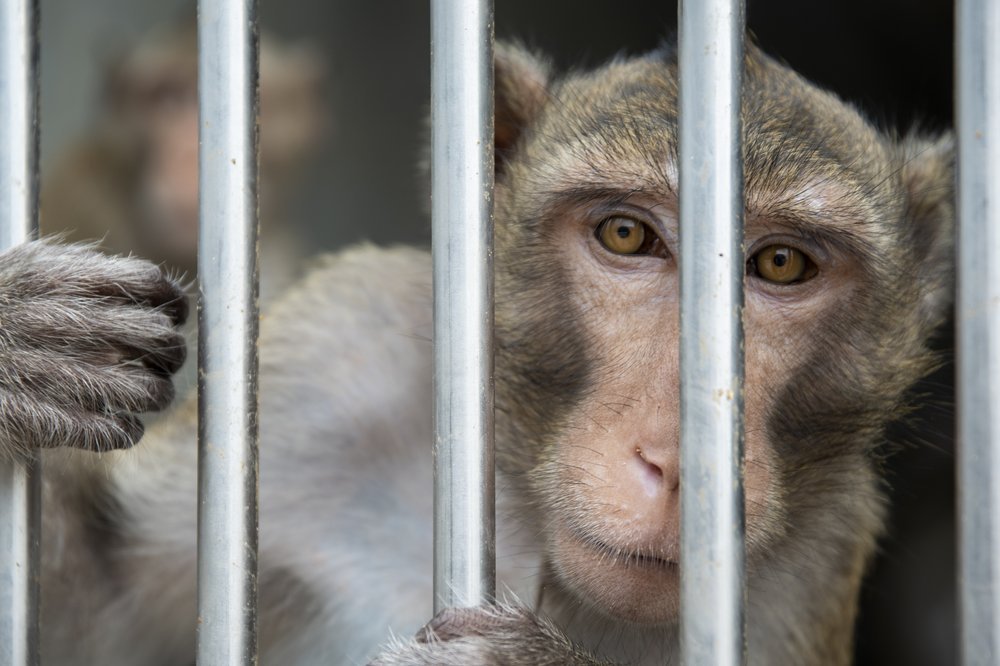Air France Vows to Stop Shipping Monkeys to Laboratories
The major airline, which has long played a significant role in transporting non-human primates for research, has announced that it will stop doing so as soon as its current contractual commitments come to an end.
This story is supported by:
Macaque breeding centre, Cambodia
Air France has announced that it will cease transportation of monkeys to laboratories, a move that animal rights activists have hailed as a “massive victory”.
The airline announced the decision on Twitter, stating that it will “end this activity as soon as its current contractual commitments with research organisations are fulfilled.”
The animal rights group Action for Primates, who campaign globally on behalf of non-human primates, praised the decision.
“A campaign by Action for Primates, One Voice and Stop Camarles has been urging Air France to stop transporting monkeys, highlighting the role of the airline as a major transporter of non-human primates for research and toxicity (poisoning) testing.
“The company has been flying thousands of monkeys across the world from Mauritius and Vietnam, destined for laboratories in Europe and the USA.
“We are grateful that Air France will now become part of the growing list of passenger airlines that have ended their involvement in the cruel international trade in non-human primates ”
People for the Ethical Treatment of Animals (PETA) have also long-campaigned for Air France to stop transporting monkeys across the globe to laboratories. The group organized multiple demonstrations and collaborated with celebrities including Dr. Jane Goodall, rock icon Peter Gabriel, and James Cromwell, who caged himself at LAX.
“Air France’s announcement means that more primates will remain in nature with their families instead of being trapped and imprisoned on decrepit breeding farms and inside terrifying laboratories,” said PETA in a statement. “This brings us one step closer to shutting down the trafficking of monkeys for failed experiments in this age of state-of-the-art, modern methods like organs-on-chips.”
Air France joins the growing list of passenger airlines that have vowed not to transport non-human primates to laboratories, including American Airlines, British Airways, United Airlines, Eva Air, Air Canada, China Airlines, Kenya Airways, and many others.
Every year, airlines transport tens of thousands of monkeys to laboratories around the world for the international trade in non-human primates. The monkeys are flown as cargo in small transit crates typically too small for them to stand up properly. Activists say that the animals endure inadequate ventilation, loud noise, and extreme temperatures on routes that can last more than 30 hours. As a result of the traumatic journeys, they may succumb to serious illness, or even death.
Last November, monkeys being flown from Cambodia to the U.S. for laboratory research by the Spanish airline Wamos Air perished in crates on board the plane.
According to Action for Primates, Air France has long played a major role in the transportation of non-human primates, particularly long-tailed macaques from Mauritius and Vietnam for use in research and toxicity (poisoning) testing in laboratories in Europe and the U.S.
Long-tailed macaques in laboratory. Photo credit SOKO Tierschutz & Cruelty Free International
The most commonly traded non-human primate species for animal experimentation is the long-tailed macaque. The U.S. has imported nearly 90,000 individuals - the vast majority from Cambodia - over the past three years.
The International Union for Conservation of Nature (IUCN) moved the species from “least concern” to “vulnerable” last year after their numbers rapidly dwindled. The major threat to the species is hunting. In mainland Southeast Asia, such as in Cambodia and Vietnam, females are taken into breeding facilities and males are exported internationally primarily for use in laboratory research, according to IUCN.
Animal campaigners have long campaigned against the cruelty of animal testing, which continues to use more than 100 million animals - including monkeys, dogs, cats, horses, and guinea pigs - in experiments every year in the U.S. alone.
The animals face little-to-no protection: under the Animal Welfare Act (AWA) - the law that governs the use of animals in laboratories - animals can be burned, shocked, poisoned, isolated, starved, forcibly restrained, addicted to drugs, and brain-damaged. For 95 percent of the animals used in laboratories, painkillers are not required, according to People for the Ethical Treatment of Animals (PETA).
Despite the horrific cruelty involved and the low success rate, the U.S. government continues to spend more than $15 billion on animal testing - meaning millions of tax-payer funds are spent on cruel animal experiments each year.
But there’s hope. Some of the world’s most forward-thinking scientists and innovators are working to develop new methods, such as 3D bioprinting, that will advance science and spare animals from suffering.
WAMOS Air, a little-known Spanish airline owned in part by Royal Caribbean, is one of the airlines that are yet to ban the transport of macaque monkeys across the world to laboratories. Please join Species Unite in adding pressure to WAMOS Air and Royal Caribbean by signing our urgent petition here.
We Have A Favor To Ask…
Species Unite amplifies well-researched solutions to some of the most abusive animal industries operating today.
At this crucial moment, with worldwide momentum for change building, it’s vital we share these animal-free solutions with the world - and we need your help.
We’re a nonprofit, and so to keep sharing these solutions, we’re relying on you - with your support, we can continue our essential work in growing a powerful community of animal advocates this year.
More stories:
Species Unite
A collection of stories of those who fight the good fight on behalf of animals.







The 30-acre lab closed after decades spent experimenting on dogs and cats. Now, an animal welfare charity has stepped in to make the space into an animal sanctuary for ex-lab animals.